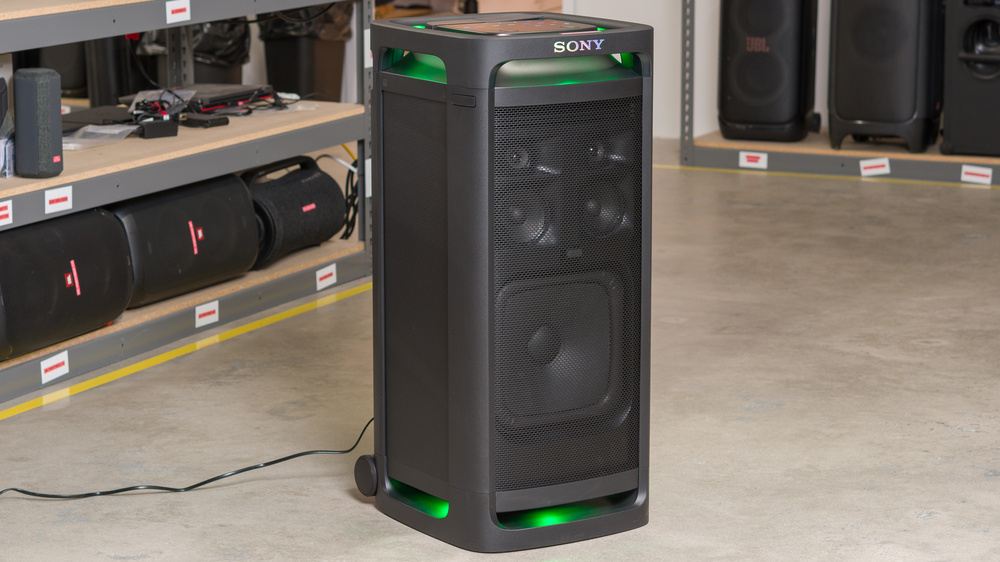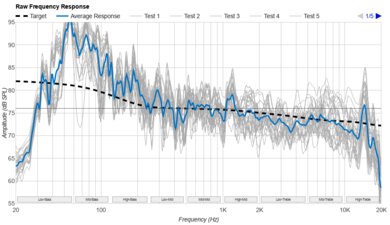The Sony ULT TOWER 9AC is the second largest of the party speakers in the brand's ULT POWER SOUND series. The sizable speaker on wheels houses seven speakers: four tweeters, two for mid-range frequencies, and a large 320 mm (12.6") woofer for supplying the bass, and it promises 360-degree sound and room correction. Kitted out with two 1/4" inputs for mics or guitars, audio effects like echo, and a customizable lightshow, it's poised as your next one-stop party solution, so long as you have a power outlet nearby.
Our Verdict
The Sony ULT TOWER 9AC is good for listening to music. For the bassheads, it provides extra low-end boost by default via the 'ULT' sound modes, so you feel the rumble, and it plays back in stereo without downmixing. If you're not fond of heavy lows, you can play around with the app's EQ for more detail in the treble, and it gets plenty loud. Two mic inputs (or one mic input and a guitar input) mean you don't need to go to the bar for a karaoke performance. Plus, sound and lighting effects add some extra ambiance. The controls are intuitive and comprehensive for playback, effects, input selection, and more. Pairing a second device allows seamless control, and LDAC is available for higher-resolution audio. Outside of Bluetooth, an AUX input and an Optical input are available. On the downside, it might be overkill for some people's needs due to its size, and by itself, the speaker's sound is sensitive to listening angles.
Tuned for bassheads.
Intuitive and comprehensive controls and app.
Flexible connectivity for mics, guitar, Bluetooth, and wired audio.
Gets loud enough to fill most spaces.
Despite the wheels, it's not very portable.
How it sounds is fairly affected by your listening angle.
The Sony ULT TOWER 9AC is alright for videos and movies. Connectivity is a bit upgraded from most speakers: if you have a TV or video projector, it uses an Optical input, which is pretty unusual for a party speaker. There's also a standard AUX input for added flexibility. Bluetooth latency with iOS devices is quite low and ought to sync A/V relatively well, while Android latency is elevated and could lead to lip sync mismatch. Its frequency response can deliver the low rumble and boom necessary for an immersive experience, though the speaker is sensitive to directivity and requires good placement. Depending on the size of the space and the audience, it'll offer a reasonably good movie experience in a pinch (so long as you're not counting on surround sound and Atmos), but if you're airing an outdoor movie to a larger crowd, some of the audience may have trouble picking out dialogue if they aren't facing the speaker.
Intuitive and comprehensive controls and app.
Optical and AUX inputs for video sources.
Gets loud enough to fill most spaces.
Despite the wheels, it's not very portable.
How it sounds is fairly affected by your listening angle.
Bassy default tuning can affect the the clarity of voices.
The Sony ULT TOWER 9AC is middling for podcasts. You can certainly use it for listening to your favorite podcasts, but it's also overkill for most people. Its cumbersome size and the necessary power outlet limit where you can take it, though to be fair, its massive volume output is loud enough that whatever you play in one room will very likely reach another room. Still, despite the tweeters facing the back of the speaker, the sound is fairly susceptible to directivity, which impacts the balance and clarity of higher register sounds like voices if you aren't facing the front of the tower. That said, you can connect it to multiple devices simultaneously, which adds one small layer of convenience.
Intuitive and comprehensive controls and app.
Despite the wheels, it's not very portable.
How it sounds is fairly affected by your listening angle.
Bassy default tuning can affect the the clarity of voices.
The Sony ULT TOWER 9 doesn't support a voice assistant.
The Sony ULT TOWER 9AC isn't ideal for outdoor use because it needs an electrical power outlet, which limits where you can use it. You can certainly wheel it into your backyard with an extension cord, but it's also not weatherproof, so be aware of the forecast if you take it outside.
Changelog
-
Updated Aug 14, 2025:
The Frequency Response Accuracy box was updated to mention the flatter tuning of the JBL PartyBox 520.
-
Updated Jul 10, 2025:
We've updated the Dust and Impact resistance rating in the Build Quality section of this review from 'No' to 'Unspecified' due to the lack of information on the manufacturer's website.
- Updated Jun 18, 2025: Review published.
- Updated Jun 11, 2025: Early access published.
Check Price
Differences Between Sizes And Variants
The Sony ULT TOWER 9AC only comes in one color, 'Black.' Here's a photo of the label for our unit. There's a battery-powered version called the Sony ULT Tower 9 (without 'AC'), and while we expect some functions are similar, like the app and controls, other performance metrics may vary from the AC model, so our results are only valid for our unit.
If you encounter another variant, please let us know in the comments, and we'll update our review.
Popular Speaker Comparisons
Once the job of several pieces of audio equipment and their associated cables, party speakers are the all-in-one answer to pop-up events and DIY karaoke venues. Party speakers like the Sony ULT TOWER 9AC combine a little bit of everything like a Swiss Army knife, so while a single speaker isn't a true substitute for a proper PA or sound system, its appeal is its ease of use and flexibility. The JBL PartyBox 710 is roughly the same size and weight as the Sony, and both reach a similarly loud max volume. However, if you want something smaller, the JBL PartyBox Stage 320 weighs almost half of the other two. The PartyBox 710's frequency response is a little more balanced by default, but arguably, the Sony's bassy emphasis may be more appealing, while the PartyBox Stage 320 sounds decidedly brighter than either. Still, these Bluetooth-capable stereo speakers include EQ in the app, as well as mic and guitar inputs, so you have similar options in this regard.
One limitation of both the Sony and PartyBox 710 speakers is that they're not battery-powered, whereas the PartyBox Stage 320 can last 23 hours on a single charge. If you want something even smaller, the Bose S1 Pro+ weighs roughly a quarter of the Sony's heft. While the Bose isn't as loud—it's still pretty loud—or thumpy in the bass compared to the Sony, unlike the other speakers in this comparison, you can carry it single-handedly, and its battery lasts around 10 hours. Basically, it's up to you and your specific Goldilocks use case.
To remedy decision paralysis, check out the best speakers for parties, the best speakers for karaoke, and the loudest Bluetooth speakers.
Choosing between the JBL PartyBox 710 and Sony ULT TOWER 9AC comes down to preferences for most people because they're similarly large and hefty. If you want a balanced sound with less compression in the bass and better directivity, the JBL slightly wins out. It's also IPX4-rated, while the Sony's control panel is apparently splashproof-only. Connectivity is fairly similar: mic and guitar inputs, wired via an AUX cable, Bluetooth, and each supports stereo and party modes with compatible speakers. The Sony offers the LDAC Bluetooth codec, which is a step above the JBL, and an Optical port for TVs. Still, it may come down to something as simple as which one has a bassier tuning (the Sony) or which one's app interface you prefer.
The JBL PartyBox Stage 320 is an optionally battery or A/C-powered speaker that weighs nearly half of the larger, Sony ULT TOWER 9AC. Its frequency response is more balanced, but it doesn't have as much low-end as the Sony. However, it compresses less at max volume, and despite its smaller size, it still gets very loud. Its controls are straightforward and focus on audio playback, while the Sony includes direct controls of the lights. Both include mic and guitar inputs and similar Bluetooth and wired connectivity, although the JBL has a wired line out, which is handy for adding any speaker with a line-in, and the Sony includes Optical input for connecting a TV or projector. On the other hand, if you're into bassy tuning, the Sony is the way to go. Like the JBL, it gets loud and it's quite bassy. That said, you need a power source nearby to use it.
The Sony ULT TOWER 9AC and JBL PartyBox 1000 have different strengths. While both are large and loud speakers with comprehensive apps that include EQ, the Sony plays back audio in stereo, whereas the JBL downmixes to mono unless you buy a second identical speaker. The Sony also weighs less and is easier to move. Besides similar Bluetooth and mic inputs in common, the Sony includes an Optical port, while the JBL uses RCA. The Sony sounds notably bassier by default, while the JBL's frequency response is more balanced out of the box, and it compresses less at full volume. Other differences are more niche, such as a DJ effects pad on the JBL.
Despite belonging to the same ULT POWER SOUND line, the Sony ULT FIELD 3 and Sony ULT TOWER 9AC are made for completely different scenarios. Your needs will determine which makes more sense. The ULT FIELD 3 is much smaller and battery-powered for portable adventures and toting around with you. While it includes inputs for a mic and guitar, it's not loud enough to cut through a crowd. In contrast, the ULT TOWER 9AC needs to plug into a power source, and while it has wheels, it's comparatively very large and heavy. You get more low-end due to its size, and it reaches high volumes, plus the connectivity still includes mic and guitar inputs.
Test Results

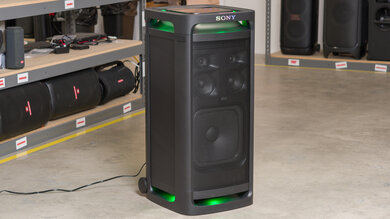
The Sony ULT TOWER 9AC is a very large party speaker that uses a power outlet. Its design looks like a PA speaker suspended in an open frame with two small wheels to transport the speaker along relatively smooth surfaces. The handle is integrated into the top of the speaker frame, so you can't adjust it to your height. It shines RGB lights from the bottom and the top of the tower, and there's a somewhat oversized and reflective logo on the front. Otherwise, its all-black colorway and mostly matte finish are somewhat subdued. The controls are found on the flat top of the speaker.
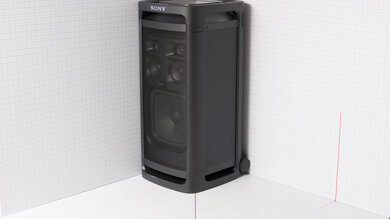
The Sony ULT TOWER 9AC isn't very portable. Unlike the battery-powered Sony ULT TOWER 9, this model requires an A/C power outlet, which effectively limits its portability to wherever you can plug it in. It's quite heavy, and the built-in wheels make it easier to move it around, but they're fairly small without much clearance. Plus, the handle is a one-size-fits-most design integrated into the top of the speaker's frame, so you can't adjust it to your height, which is awkward if you're tall and wheeling it over longer distances.

The speaker's build quality is not bad. It's mainly made of sturdy plastic, some of which is recycled, according to the manufacturer. The grille is perforated metal to protect the drivers, and the underside of the speaker has slip-resistant rubber feet. Two small wheels are suitable for rolling the speaker over flat surfaces, but they're hardly meant for rugged terrain. Suggesting that the speaker isn't meant to travel far, the handle, which is simply the top of the frame, is a bit slippery and lacking any extra grip, and it requires that tall people crouch and short people use a more acute angle to move the speaker.
All of the ports have protective rubber flaps to keep out debris and water. It's not rated as water-resistant, which is pretty normal for large party speakers (though the JBL PartyBox 310 has an IPX4 rating, so it's not impossible), but Sony claims the control panel is splashproof when the 1/4 inch ports are sealed off. Each side of the speaker has plastic pop-out mic holders, but you need to purchase microphones separately. Because the speaker requires external power, the simple A/C power cable is less cumbersome than an outboard power supply with a brick.
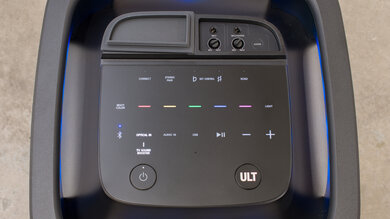
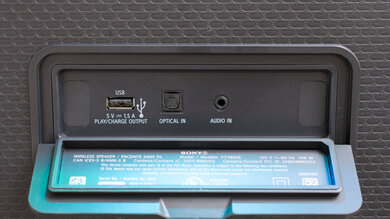
The Sony ULT Tower 9AC has satisfactory controls. Most of the commands are handled by a responsive and backlit touch panel, except for a physical power button and 'ULT' button (to quickly cycle through sound settings). There are also dedicated gain knobs for each of the two 1/4" microphone/guitar inputs.
The controls are straightforward, labelled, and intuitive, which you can explore here. Many settings are instantly accessible without relying on the app, like playback, input selection, Stereo and Party modes for additional speakers, karaoke controls, and RGB lighting. A mixture of light indicators and chimes and a voice prompt alert you for functions like Bluetooth pairing, connection statuses for Bluetooth, as well as Party and Stereo modes. Each time the 'ULT' button is pressed, the speaker emits a chime, so you know it registered. Rather than chime with each command, the speaker uses lights to indicate the current input selection, volume changes, and min/max volume, and whether features like echo are on. If left idle for 15 minutes, it'll silently power off without any audible warning, and some of the dedicated light indicators are a bit small, which might be hard to see in some settings.

- Sony ULT TOWER 9AC
- A/C power cable (1.52 m / 5 ft)
- Optical cable (1.52 m / 5 ft)
- Reference guide
- Warranty guide
- Unboxing guide
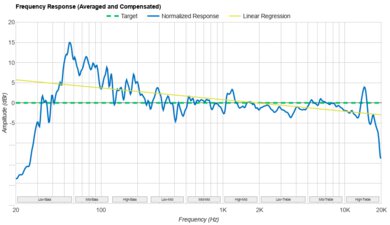
The Sony ULT TOWER 9AC has very good frequency response accuracy. Like the rest of the ULT range, including the headphones like the Sony ULT WEAR, this speaker emphasizes the low-end. The frequency response injects extra thump and weight on kick drums and basslines in tracks like Charlie's Comet by Mandrake Handshake; meanwhile, the fairly even mids offer lead electric guitar breaks, melodic keys, and saxophones plenty of room to cut through for the most part. Due to the lower frequency emphasis and slightly de-emphasized treble, busy mixes may have slightly diminished clarity when it comes to vocal articulation. Unsurprisingly, it doesn't matter which Bluetooth codec you use (LDAC vs SBC); it doesn't meaningfully affect the frequency response. For a more neutral tuning with deeper lower frequency extension, check out the JBL PartyBox 520.
The graph shows the Bluetooth connection's response with the room correction, Sound Field Optimization enabled (though we didn't find a meaningful difference with it off), and set to the 'ULT 1' preset mode. By default, the speaker is set to 'ULT 2'; however, we found that this preset is substantially more boomy and muddy in the bass and low-mids, and 'ULT 1' matches our target frequency response more closely. Each 'ULT' mode also causes a jump in output volume compared to leaving it off. We also found that the speaker sounds the most accurate when it's placed vertically and on the floor, as opposed to on a table.
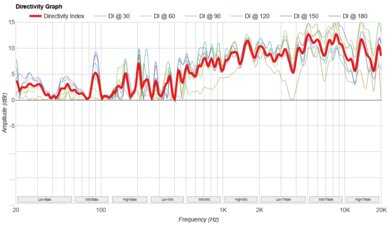
The soundstage is not bad. Despite the two tweeters located at the back of the speaker, the soundstage's directivity is still sensitive to the listening angle. Unfortunately, we didn't find the 360-degree sound advertised by the manufacturer to be especially consistent sounding from all angles. It's a stereo speaker, but like a lot of tower-style party speakers, you don't get an especially wide sense of L/R separation because the drivers are necessarily close together. The manufacturer states you should only use the speaker positioned upright (and the L/R channels don't change if you position it horizontally), but we tried placing it on its side anyway, and this doesn't widen the soundstage either.
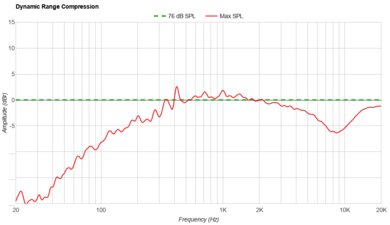
The Sony ULT TOWER 9 has good dynamics. Since it reaches very loud output volumes, most people won't max it out, meaning compression isn't necessarily a major factor. That said, at maximum volume, there's notable compression in the bass and some in the mid-treble, too, which can cause pumping and impact the dynamics and clarity of your music. Again, this is a different beast from smaller speakers, though, like the Sony ULT FIELD 3, which you might actually crank to full volume all the time.
This speaker runs on A/C power from an electrical outlet. A variant called the Sony ULT TOWER 9 (without the 'AC' suffix) is battery-powered, but we haven't tested it.
This speaker also includes a USB-A port for charging your devices when it's on. If left idle for 15 minutes, the speaker automatically powers off. You can also enable the automatic power-on function (indicated by an orange light) in the app settings after performing the initial Bluetooth setup for use during subsequent listening sessions.
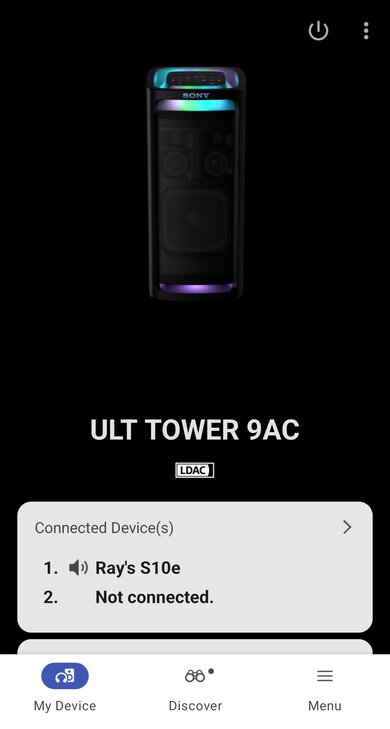
The Sony Sound Connect app is great, and if you own other Sony speakers or headphones, chances are you don't need to download yet another app. Most of the controls are accessible on the speaker's touch panel, and these are mirrored in the app (as you can see), but the app adds extra features such as a 10-band equalizer with a spot for a custom EQ.
Besides the standard fare firmware updates, you can choose Bluetooth codec priorities, input selection, karaoke and DJ sound effects, lighting effects, as well as sound modes like the ULT presets and a TV Sound Booster.
The Sony ULT TOWER 9 has plenty of wired connection options. There's an Optical port, which is useful for video projectors and TVs. If you have a laptop with your lossless audio files, the AUX input is available. The speaker also comes with two dedicated 1/4 inch inputs, which are meant for microphones or guitars. You can buy the Sony ULT MIC Wireless Microphone (also known as ULTMIC1) separately if you want a pair of the wireless mics designed for the speaker line, but we've not tested them out. There's also a USB-A port, which can either access audio files on a flash drive (MP3 files only, though) or charge your phone.
This speaker's Bluetooth connectivity is excellent. You can use its multipoint feature to connect with two devices for seamless control without hitting pause to switch between them, but Stereo and Party modes disable this function. Its iOS latency is low, and the Android latency is a bit higher, so if you're syncing to audio and video, your results may vary depending on the apps and operating system.
The speaker supports SBC, AAC, and LDAC Bluetooth codecs. You can also choose to set up Stereo or Party modes via the control panel; these only work when using a Bluetooth connection. Stereo Mode splits the audio into left and right channels between two identical speaker models. Party Mode lets you add a compatible Sony speaker, and each speaker plays back the same signal. We successfully added the Sony ULT FIELD 3 in Party Mode via the 'Connect' button on the speaker. If you power off the speaker, you'll need to reconnect the speakers used for Party Mode, and only one speaker handles the controls. According to the manufacturer, if you connect an additional compatible speaker for Stereo or Party mode, it automatically switches to the SBC codec.
